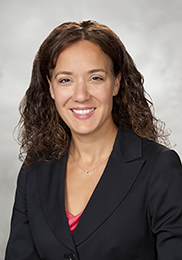
Building a Support Structure: An Oncologist's Story
Building a Support Structure: An Oncologist’s Story
Doctor explains how investments in staff and services through value-based care ensure patients get needed treatment and help navigating the health care system.
Published September 12, 2024
Making medical decisions is the tip of the iceberg when providing care for patients, according to an oncologist (cancer doctor) in the Trinity Health system.
Dr. Kathleen Beekman, who practices in southeastern Michigan, worries about the cost of oral chemotherapy, which she said has been “skyrocketing” in recent years.
Beekman’s practice includes a pharmacy team that helps patients manage prescriptions and defray the cost of medications by finding financial support, including from a local Michigan-based nonprofit.
“We looked at [EOM and its predecessor] the Oncology Care Model as an opportunity to expand support around the patients and create structure around the physician so the physician can take care of medical decisions.”
Trinity Health is a participant in the Enhancing Oncology Model (EOM), a pilot run by the Centers for Medicare and Medicaid Services (CMS) Innovation Center. EOM aims to improve coordination across cancer patients’ health care providers and offers a monthly payment to participating providers to invest in patient-centered, individualized services that help people with certain cancers navigate and manage their care.

Along with extra pharmacy support, participating in the model encourages Beekman’s practice to offer patients a same-day clinic and access to a senior medical assistant who oversees scheduling and manages transitions of patient care to other providers, such a surgeons, radiologists, and psychiatrists.
Beekman recently received a grateful letter from the daughter of a patient who, without easy access to the clinic, would have visited an emergency department to get care.
“We looked at [EOM and its predecessor] the Oncology Care Model as an opportunity to expand support around the patients and create structure around the physician so the physician can take care of medical decisions,” said Beekman.
Beekman first experienced a successful team-based approach to care during her fellowship and was surprised it was not necessarily the norm.
It really hit home for Beekman when treating a nurse with cancer who expressed her frustration as a patient because she could not get anyone from the clinic to answer the phone.
Now, Trinity Health providers prioritize communication with their patients, whether by phone, text, or QR codes in examination rooms that patients can use to schedule appointments. CMS makes it easier for EOM providers to invest in communication services by paying a predictable, monthly amount of money to cover certain health care services for each patient instead of paying separately for each health care service or product.
With a team available to support whole patient care, Beekman, the oncologist, no longer worries whether someone will pick up the phone when her patients call.
In fact, she said, “I tell patients, remember when you were a new parent, and you called the pediatrician for everything? We want you to call us just like that.”